"This will all catch up with him."
A summer of organizing turned a group of 13 strangers into hundreds working together to hold their Congressman accountable for harmful legislation.
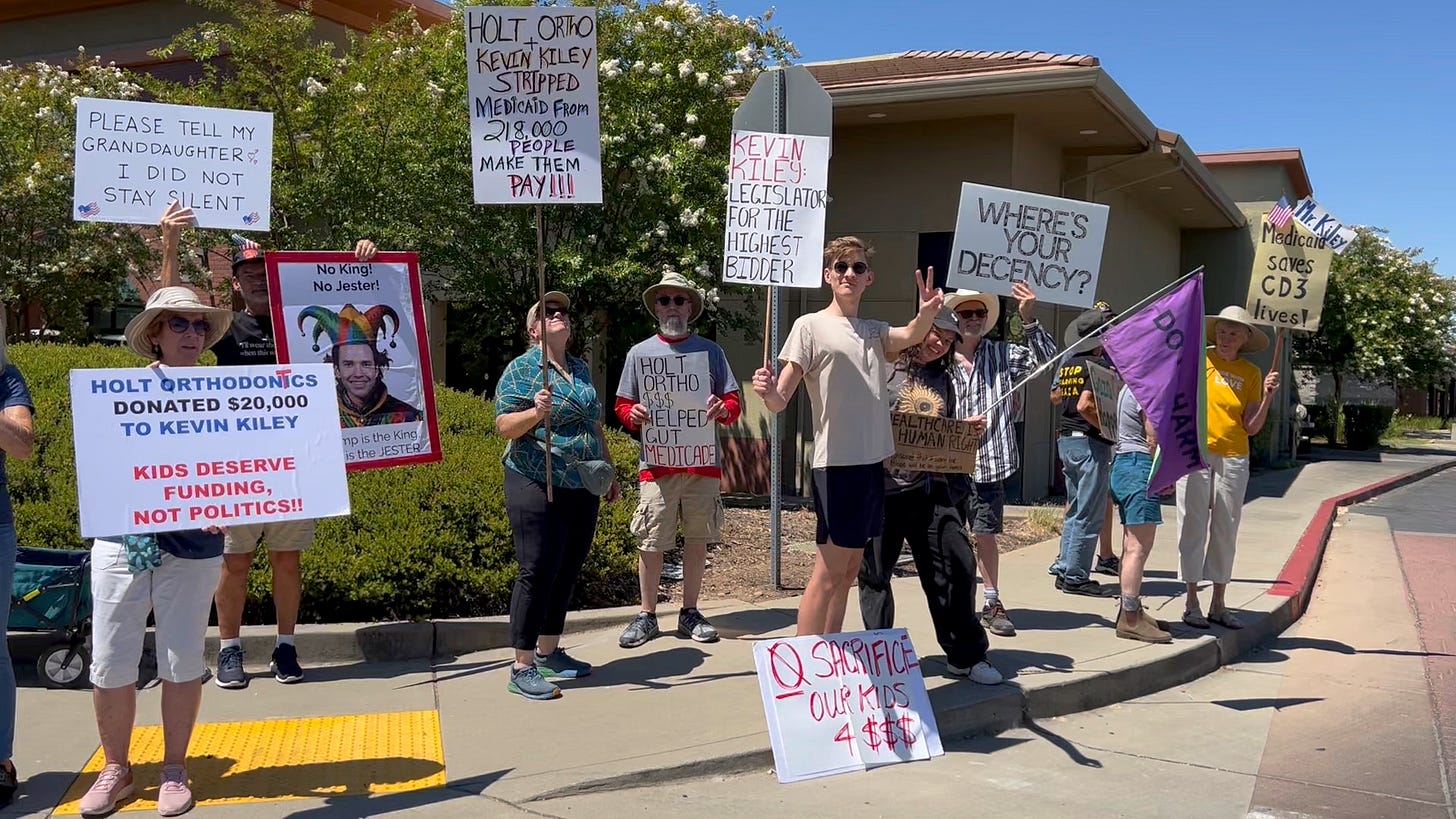
As a kid, Paul Huntley tagged along with his mother, knocking on doors for Eugene McCarthy in their Iowa City precinct. It was the 1960s; his parents were educators, and the family was deeply involved in local politics. It’s no surprise that Paul grew up to be a political junkie, always up to date on current events, the go-to friend when you’re unsure who to vote for on Election Day.
Paul joined the military, moved to California, and became an electrical engineer, but always stayed involved in national politics. He volunteered for Clinton, Gore, Kerry, Edwards, travelling to battleground states to help get out the vote for Election Day. But by 2014, he was a Bernie supporter, through and through. Bernie Sanders, he says, “can find the common humanity in everyone.”
Plus, Bernie was the only candidate talking about big systems change, like universal healthcare—a system adopted by most other developed countries but not the United States. Not only did Paul think this was good policy, but he felt it deeply: His wife was sick with cancer.
Paul doubled down for Sanders, speaking at local events, phonebanking, canvassing, and supporting tabling at local farmers’ markets. He was even an elected DNC Convention delegate for Bernie in both 2016 and 2020.
Sanders never became the Democratic nominee. Universal healthcare has not been passed.. Frustrated, Paul changed his party affiliation from “Democrat” to “Decline to State.”
Cancer
Through the COVID years, Paul’s wife became more and more ill, and he became her full-time caretaker. His focus shifted from politics to his family, his loved ones, his home, her. He was with her as her body succumbed to cancer. She passed away last year.
Paul wasn’t sure how, or if, his political activism would resurface. But when he saw the Trump administration cut funding for cancer research earlier this year, he had no choice. Having just seen his wife through her long struggle with cancer, including cutting-edge, newly FDA-approved advanced gene therapies, the thought that things were not moving forward, but now backward, enraged him.
“Everyone has a cancer story,” Paul explains. “Either you, or your family, or your friend, or their family has a cancer story. Cancer is a universal fear that humans face. Every new cancer drug in the last 20 years has been funded through government support.”
In addition to the millions of dollars pulled from research, more budget cuts were being pushed through the Big Beautiful Bill. Paul knew that additional harm was in store for cancer patients and survivors through deep reductions to Medicaid, including cutting as many as 3 million Californians’ access to care.
Thirteen Strangers
After attending a Zoom call hosted by Senator Sanders, Paul connected with other Bernie supporters he hadn’t met before in his area. Each agreed that they needed to pressure their congressman, Kevin Kiley, to vote against the Big Beautiful Bill.
Calling themselves the “Gang of 13,” they set out to host a town hall, dividing up roles from finding a location for the event and promoting it, to running sound and bringing snacks. When Kiley didn’t respond to their invitation to attend, they brought a cutout of him for attendees to address. Nearly 240 people came out.
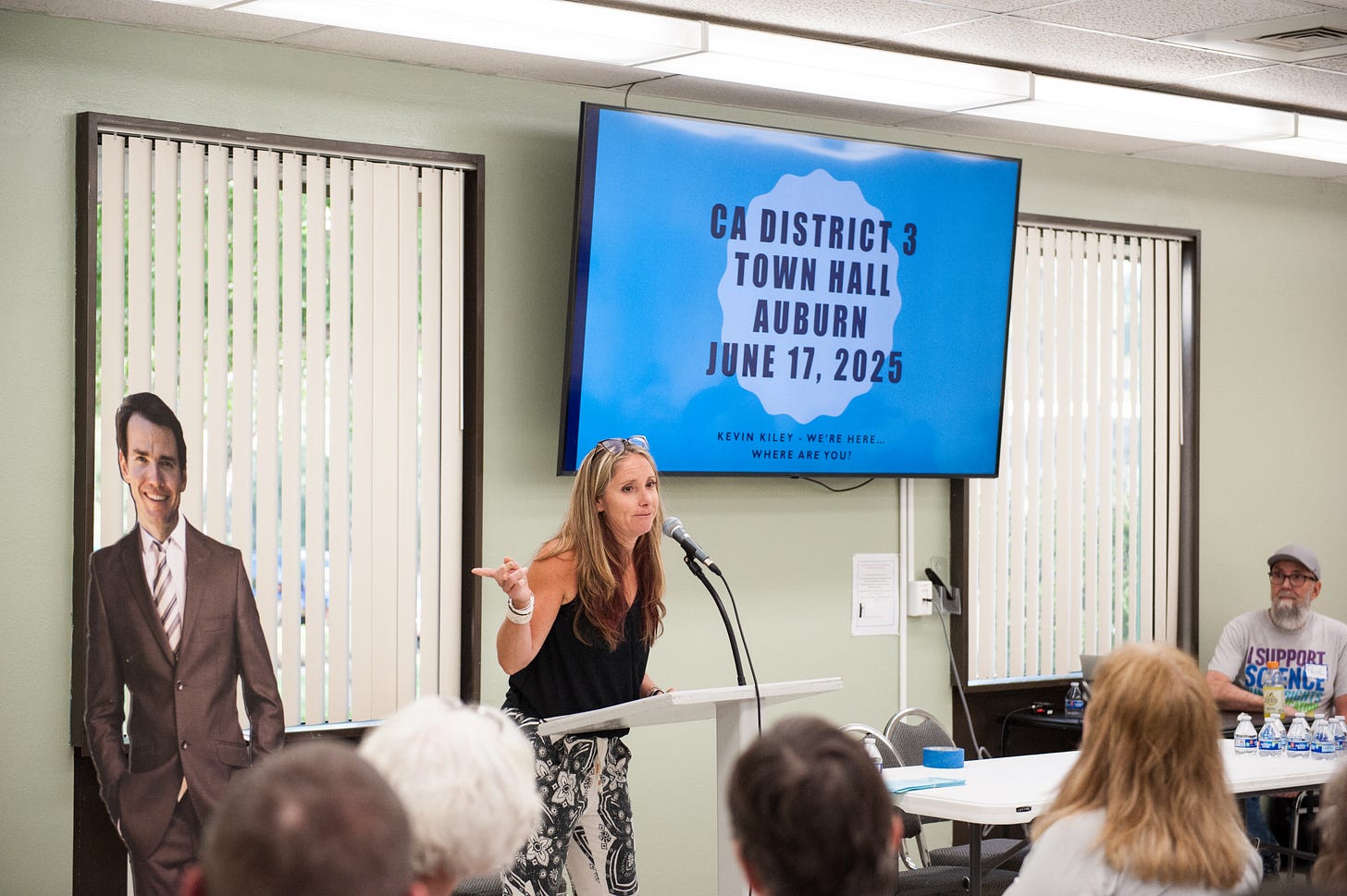
“Thirteen strangers, three weeks, and we pulled off a huge event,” says Paul, laughing. “Now that is pretty wild.”
To celebrate, the Gang met up at a local pizza place. The town hall had made it clear that they were onto something– their neighbors really cared about these issues. “It was at that pizza place that we began to plan for the future. We had heard from our neighbors that they were concerned about budget cuts to healthcare, education, science, and food assistance, and we wanted to help them fight for these things. We’ve named ourselves Gold Country Fighting Oligarchy. ”
Shut Out
The town hall attendees had signed letters to Congressman Kiley, and GCFO members gathered additional signatures at events across town. “We went to Kiley’s office in Rocklin, CA, with over 320 letters and demanded a meeting since Kiley had failed to attend the town hall,” explains Paul. “We obviously wanted to meet before the Big Beautiful Bill vote, but they kept blowing us off– in fact, they got back to us on July 5th, the day after the bill had passed.”
While frustrated by this timing, they still seized this opportunity to meet. They asked people who had attended the town hall to come: teachers, nurses, and small business owners, each of whom was being hurt by the bill’s passage. They prepared meeting notes and practiced what they would say. Finally, the meeting came; Kiley wasn’t there. Paul shared his wife’s cancer story. “The office staff was polite, and cordial, and all that; but ultimately, all they offered were platitudes and talking points,” says Paul.
This, by no means, was the first time Paul had been shut out. All this outreach, this effort, can feel futile. It’s hard to knock your head against a wall and only see bruises. He knows there is no easy gate to go through; this wall was built to keep us out. Would they ever reach Kiley?
But something else was happening: Each time GCFO held an event or hosted a meeting, more people were getting involved.
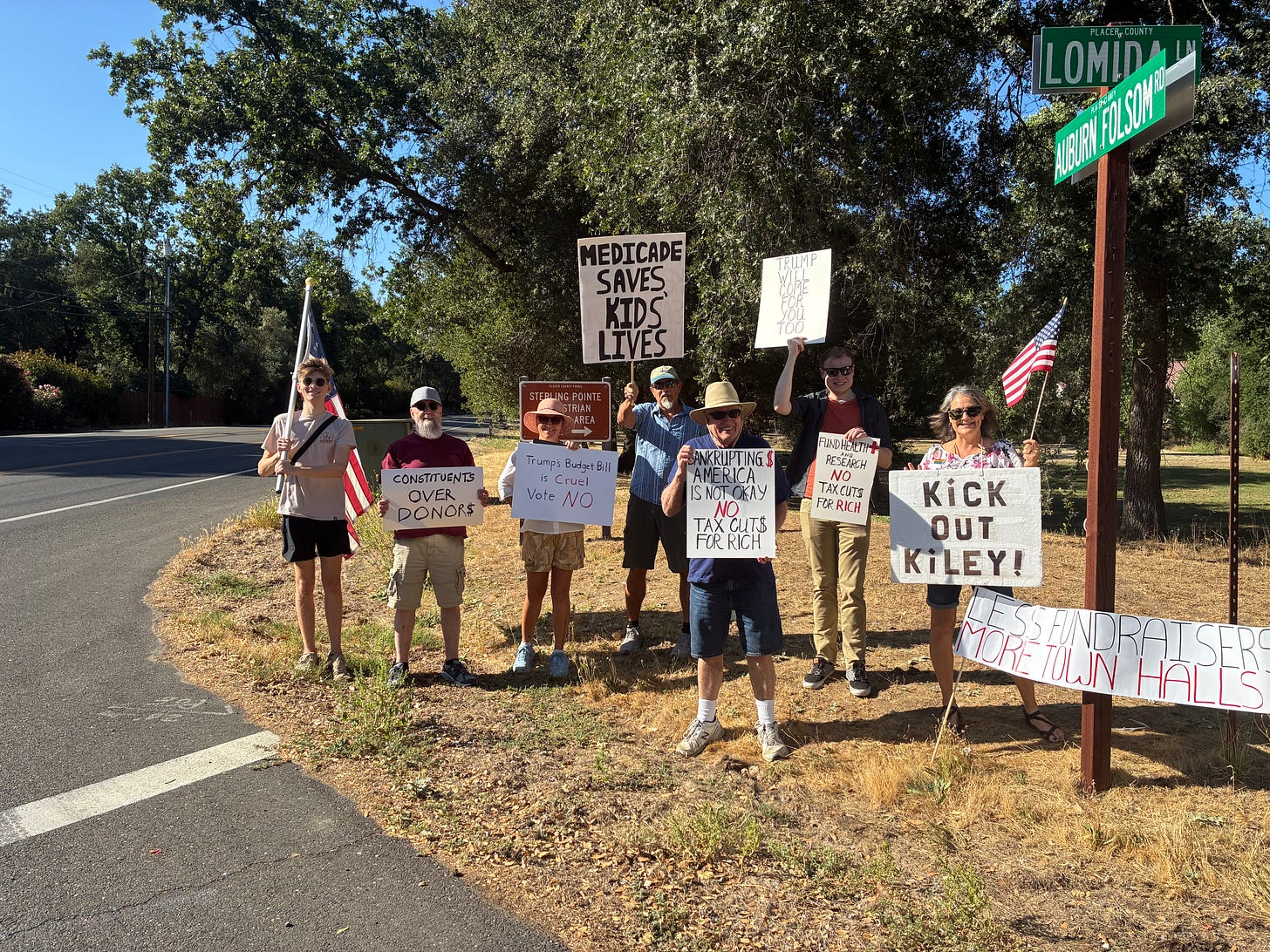
Action
GCFO spent the summer building event after event. They hosted a “honk and wave” protest outside Kiley’s office and, in August, they launched a “Month of Accountability” with repeat public actions. These events continued to bring new people out, but the wall built around the Congressman allowed him to go on as if they weren’t happening.
Instead of just keeping people in motion, they needed to get through that wall.
“We were pondering this very thing one afternoon during a video call,” Paul recalls. “We thought, well, maybe if Kiley refuses to meet with his constituents, does he meet with his donors? Do his local big-money donors feel good about their association as funders of the effort that pulled healthcare from 17 million people?”
One Kiley donor was a local pediatric orthodontist whose business claimed to treat their young patients as if they were their own. The group set out to write an open letter to Holt Orthodonture, and members delivered it to the office staff. When rebuffed, they stepped up the pressure and held a series of protests outside Holt’s local offices.
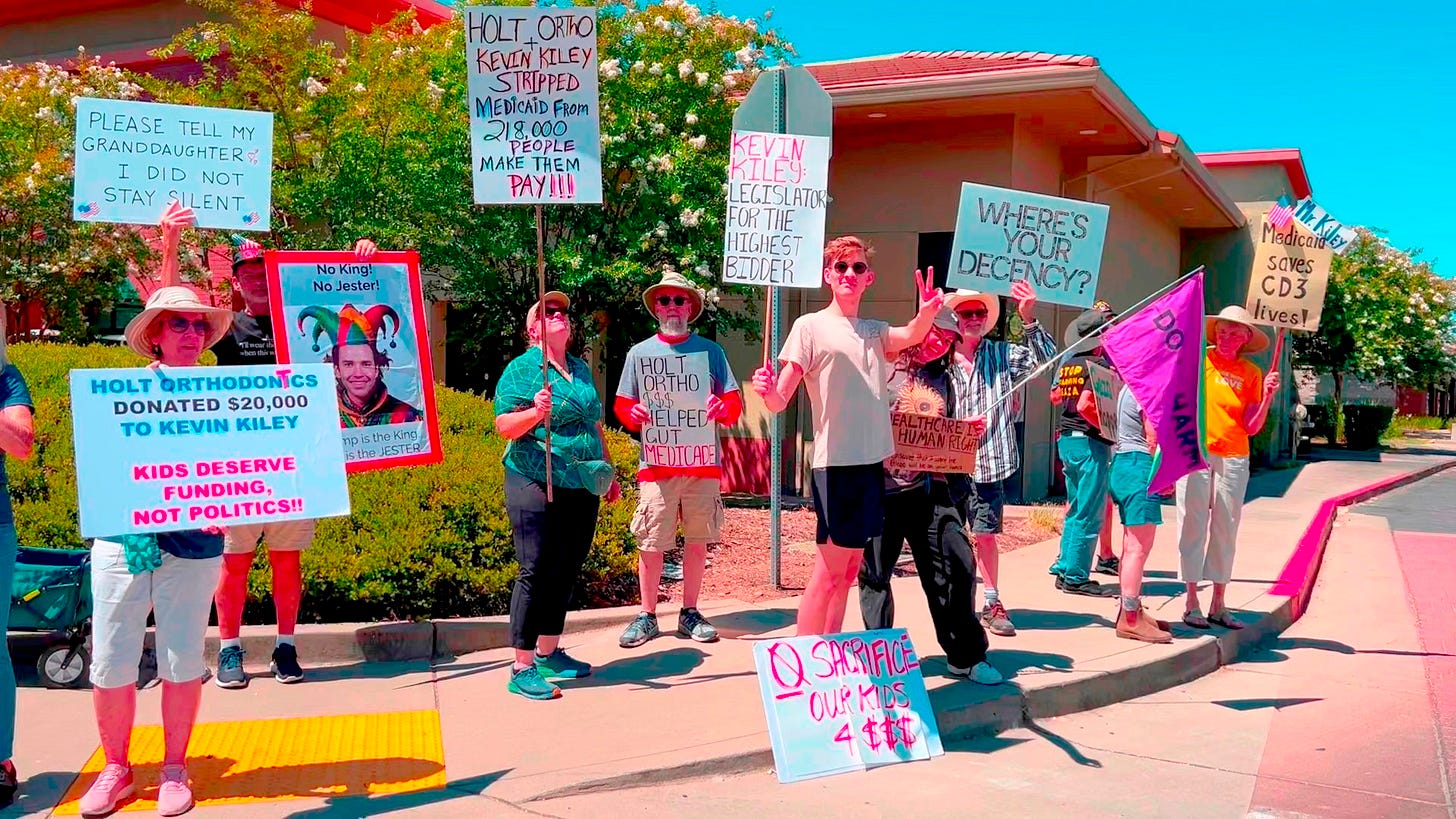
The new tactic made some uneasy. Was it fair to go after a private donor? A local business? It’s always uncomfortable to bring the fight out of more abstract spaces of justice and to the streets, parking lots, and dentist offices of your hometown. It’s uncomfortable to move from “damning the system” to calling the actors in that system by their name.
But it was also clear that to get around the walls built to protect power, they needed to do something outside the norm. “Plus,” Paul says, “150 people came out to protest the orthodontist. It was our zenith.”
Maybe uncomfortable was the way to go.
Hundreds
Gold Country Fighting Oligarchy kept growing. They formed Coordinating and Outreach Committees and launched a newsletter sent to anyone who has attended an event. “The key is to keep engaging with our supporters list, to keep growing it with newly activated people,” says Paul.
So while they had been running into Kiley’s walls, they soon had enough people-power to flip the script: They were going to build their own wall.
They learned that Kiley was going to attend a Roseville Chamber of Commerce event, so they built a “Wall of Shame” out front with 12-foot banners listing all the cuts Kiley had voted for and his donors. The banners were held by dozens of constituents who are being hurt by the bill he supported. “We flanked the entrance to the event so everyone had to walk through our Wall of Shame to get in,” Paul says, with a chuckle.
Kiley was seen getting dropped off at a back door.
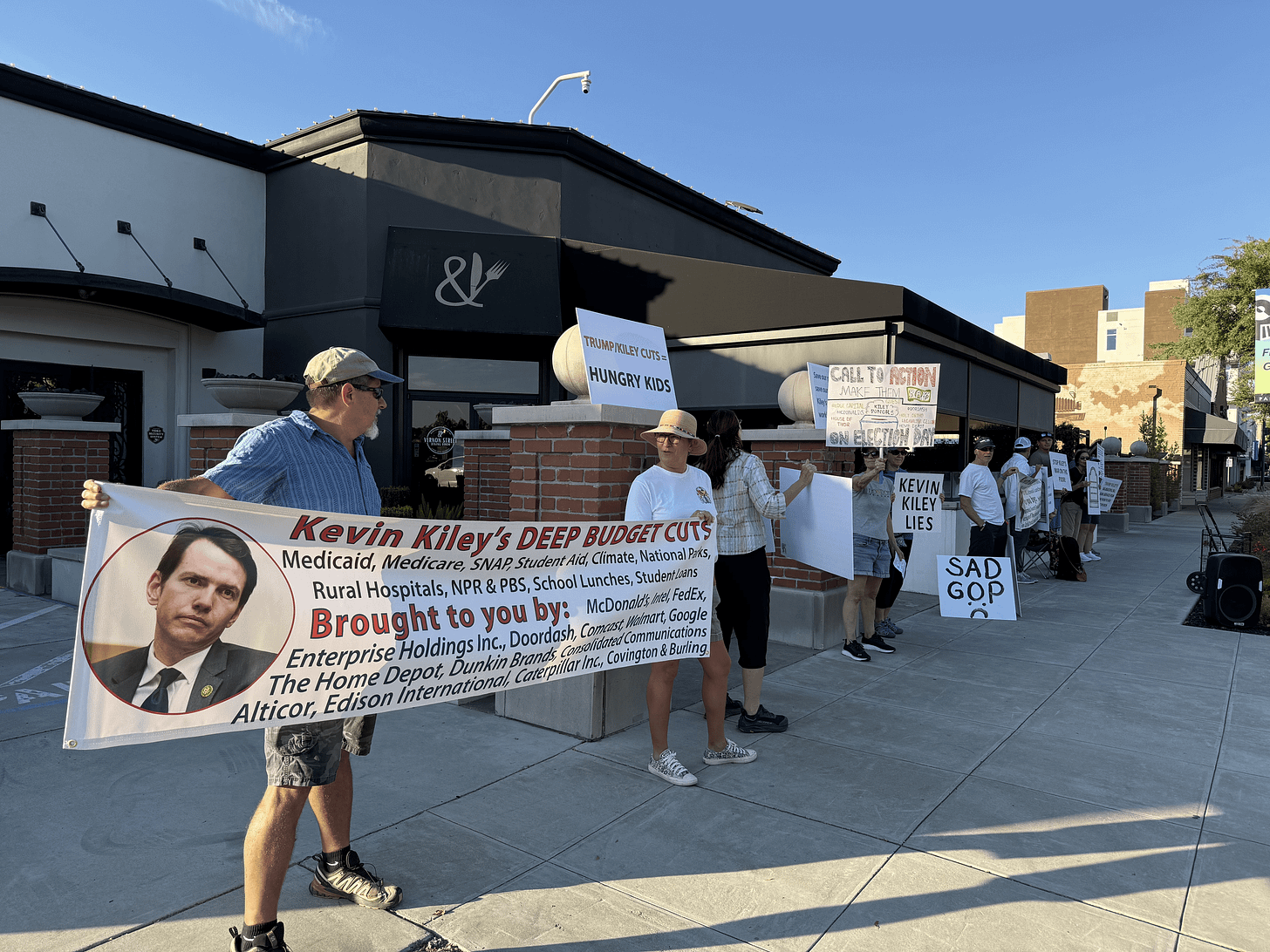
You can only ignore your constituents for so long. “Meet with us or not, this will all catch up with him.”
After decades of thinking about and being a part of electoral politics, Paul hasn’t given up. But he is thinking about how to organize in the moment we are in. That might be different than how he did it with his mom in Iowa in the 1960s, or through national politics in the 90s and 2000s.
He is seeing how, in just a few short months, a small group of 13 strangers has grown into a force that mobilizes hundreds—and they are not done yet. In Gold Country, local action– not action for action’s sake, but action to chip away at the wall– is breathing life into the world Paul wants to build.


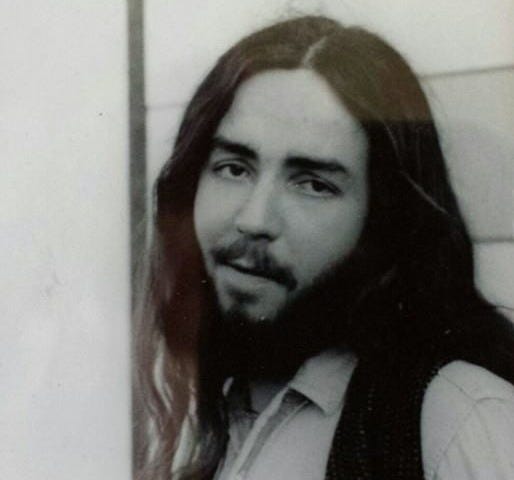
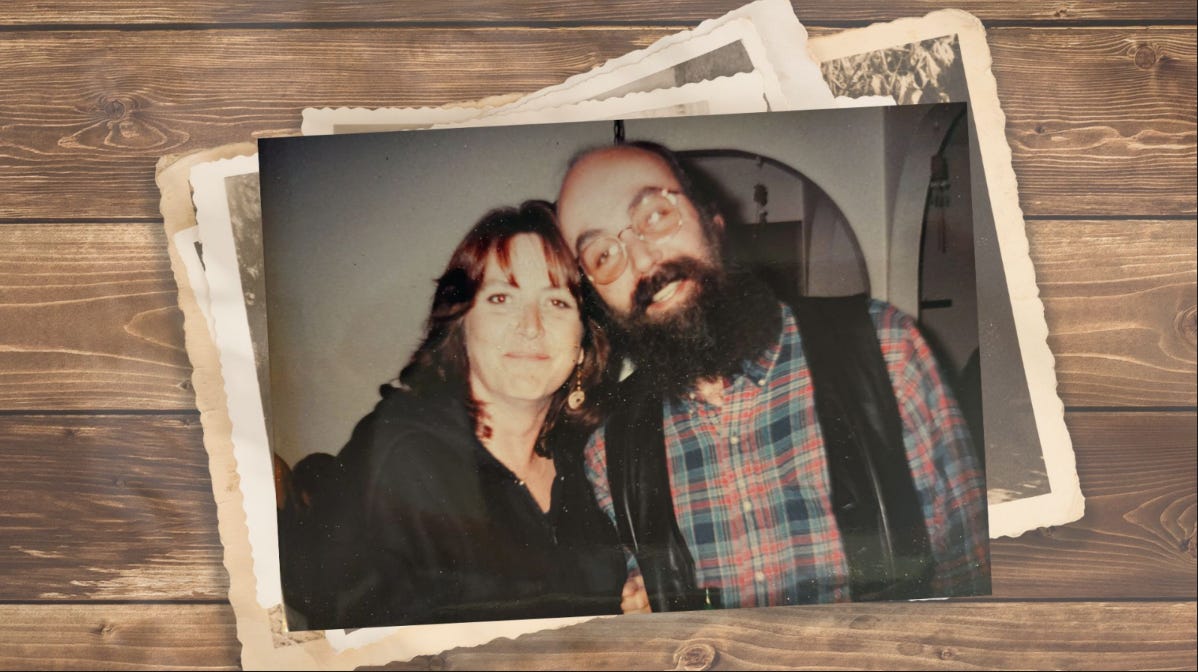
Thank you for helping us remember change begins with one person seeing a need, speaking that need and standing with courage. Thanks you to the 13 who stand together...as it is said..courage is contagious!
Paul - and you - give the rest of us hope around organizing and holding representatives' feet to the fire. Well done.